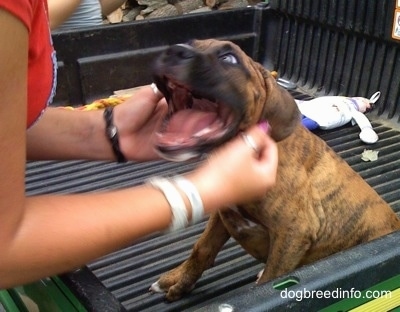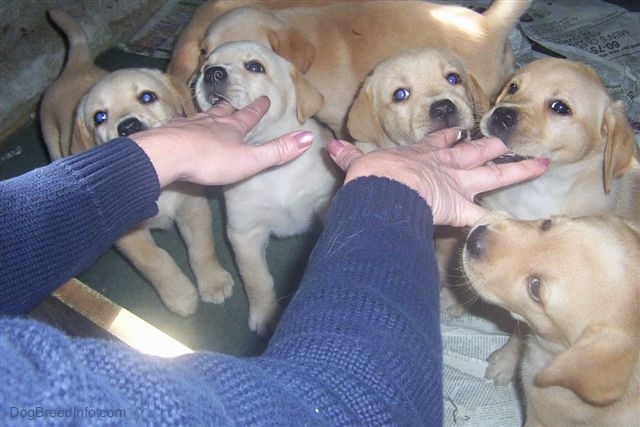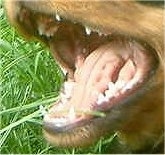
Teaching your puppy respect and manners will greatly help stop this behavior. For example: the pup should be heeling on the lead on walks and the humans should be entering all entrance and exit ways before the pup, as the leaders always go first. If your pup goes ahead of you through doorways and/or on the lead during a walk you are telling the pup it is OK for him to be the leader. If your pup is the leader then there is no reason in your pup’s mind why he cannot bite your hands if he pleases. Puppies and dogs that do not see the humans as the authority figures are less likely to respond to the human’s corrections. The more your pup sees you as his leader the less inclined he will be to bite your hands when you tell him "no."
A pup that has excessive built-up energy will also be harder to teach. This build-up of energy causes frustration making the mind reel with unhealthy excitement, so much so that the dog is not responding to your commands to stop. Working on calming his mind and draining his energy to the point where he is tired both mentally and physically will greatly improve the dog's response to your corrections. You not only have to drain the dog's energy daily, but you have to gain the dog's respect and show the dog that you are the leader and you do not wish for him to play bite on you. You do not want the dog to see you as a game, a toy, an equal or just a playmate, but rather a respectful leader.
Never let a puppy play bite on your hands even if at the moment you too think it is just a game. The pup needs to be taught from the beginning to never chew on humans. Do not play with the pup's mouth or allow others to do so.

Do not allow people to stick their hands into your pup's mouth. This will encourage them to bite on hands making it hard to curb the behavior. When a dog plays with another dog they bite on one another. Dogs need to learn to never bite or mouth humans, not even during play. If you give your dog the impression it is ok to start a play session with a human and treat them like a fellow canine, the play bite they give can not only hurt, but be confused with agression. Puppies need to learn that humans are not the same as canine playmates.

The correction will work best if you are able to tell when the pup is about to bite and give the correction a second before it makes contact. Say, "No!" and immediately stick something the puppy is allowed to chew into his mouth. Puppies have an incredible urge to chew on things. It is not fair to the pup to tell them they can never chew on anything, but rather you must teach them what is OK to chew on and what is not. Humans are a no-no; chews, dog bones and toys are a yes. Give your dog something it is allowed to chew on. Make sure to only give your pup appropriate sized bones and toys to avoid choking.
When my own 12-week-old American Bully was puppy biting on humans her breeder taught me a technique that immediately worked. Mia was bred by Lou from Dazzling Bullies Kennels and he had come by the house to visit with her. When Mia started puppy biting on Lou I noticed he had done something that immediately stopped her without upsetting her. I asked him what he just did and he said instead of pulling back away from her he simply put his finger further into her mouth and to the backside where there were no teeth as her back molars were not in yet. It was uncomfortable; Mia wanted the hand out of her mouth. As a result she stopped putting his hand in her mouth. No more puppy bites. I tried the same technique and sure enough, it worked. The next day when I petted Mia's head she didn't open her mouth to bite on me.
Lou explained that when you pull away from a dog you often create a response where the dog goes forward toward you. It is a game to them, but it can also result in a puppy bite that hurts and if the dog does that same thing when it is older it can be mistaken for aggression. Read more about Mia the American Bully.

Written by Sharon Rose© Dog Breed Info Center® All Rights Reserved